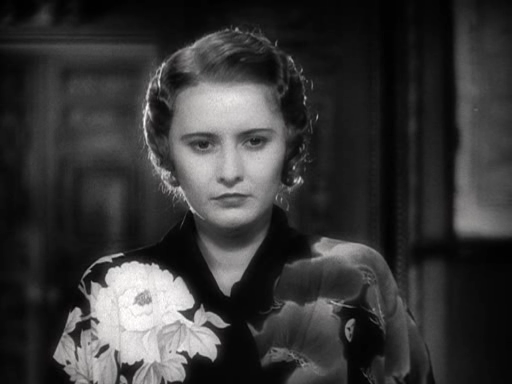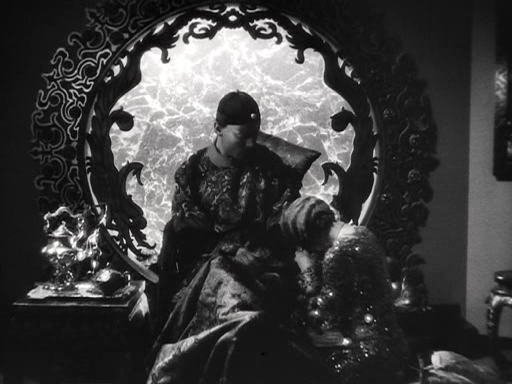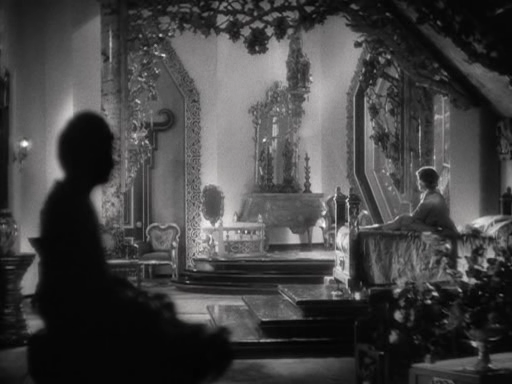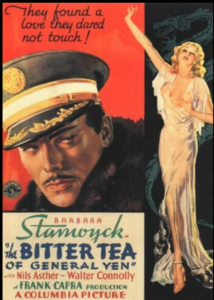|
Genres, Themes, Actors, and Directors:
- Barbara Stanwyck Films
- China
- Cross-Cultural Romance
- Frank Capra Films
- Missionaries and Revivalists
Review:
The Bitter Tea of General Yen remains a unique entry in Frank Capra’s early oeuvre. Exhibiting none of the “Capra-corn” that would mark Capra’s later populist films, Bitter Tea is a dreamy, beautifully photographed, provocative tone poem about cross-cultural tensions and inter-racial longing. Danish actor Nils Asther thankfully manages to avoid most stereotypes in his portrayal of the imposing Chinese General Yen, instead infusing his character with charisma and emotional complexity. He exhibits authority and vulnerability in equal measure — indeed, it’s easy to see why Stanwyck’s strong-willed female missionary (Megan) can’t help feeling a deep-seated attraction to him, despite her status as a betrothed woman (watch for her infamous “dream sequence” — haunting evidence of pre-code cinematic sensibility). Stanwyck is luminous in this early role — like Asther, she’s called upon to demonstrate both strength of character and emotional nuance as she contemplates, however subconsciously, a forbidden romance. The entire story takes place within the context of gorgeously baroque sets and lustrous cinematography, adding to the dream-like ambience of Megan and Yen’s tragic “affair”; the film’s ending is foreshadowed by its provocative title.
Redeeming Qualities and Moments:
- Nils Asther as General Yen

- Barbara Stanwyck as Megan Davis (nominated by Peary as Best Actress of the Year in his Alternate Oscars book)

- A provocative portrayal of “forbidden” romance

- Stunning sets

- Joseph Walker’s luminous cinematography

Must See?
Yes, as a unique gem by a famed director.
Categories
(Listed in 1001 Movies You Must See Before You Die)
Links:
|






One thought on “Bitter Tea of General Yen, The (1933)”
A must: not as well-known or as well-loved as a number of Capra’s films, it is nevertheless my favorite.
Basically an inter-racial ‘Beauty and the Beast’ in an exotic, war-torn setting – and a not-too-distant cousin of ‘The King and I’ – ‘Bitter Tea…’ has an arresting, seductive quality that lures you in. The bulk of the film is simplicity itself, as it centers on an unrealized and confused passion. The vaguely cat-and-mouse aspect of this passion is what grounds the film and what ultimately makes it powerful.
If it is not one of her most memorable roles, Stanwyck turns in a sturdy performance, as usual, and Walter Connolly meets her dependable level as General Yen’s financial consultant. But the best work here comes from Nils Asther in his brilliantly nuanced characterization of Yen (indeed, he even brings out the best in Stanwyck in the scene in which she makes a heartfelt plea for him to understand and follow at least the more humanistic tenets of Christian doctrine). Asther’s Yen always follows a slow, methodical train of thought. He is never in a hurry, never flustered, often privately amused by what he considers stupid behavior in others. He is proud, vengeful, cruel…and suave.
Special mention: relatively unknown Toshia Mori (as Mah-Li) has perhaps the film’s most difficult role to play – torn as she is between wanting to embrace finer qualities and driven to being duplicitous in order to thwart General Yen in his thirst for power. A quiet, subtle, layered performance.